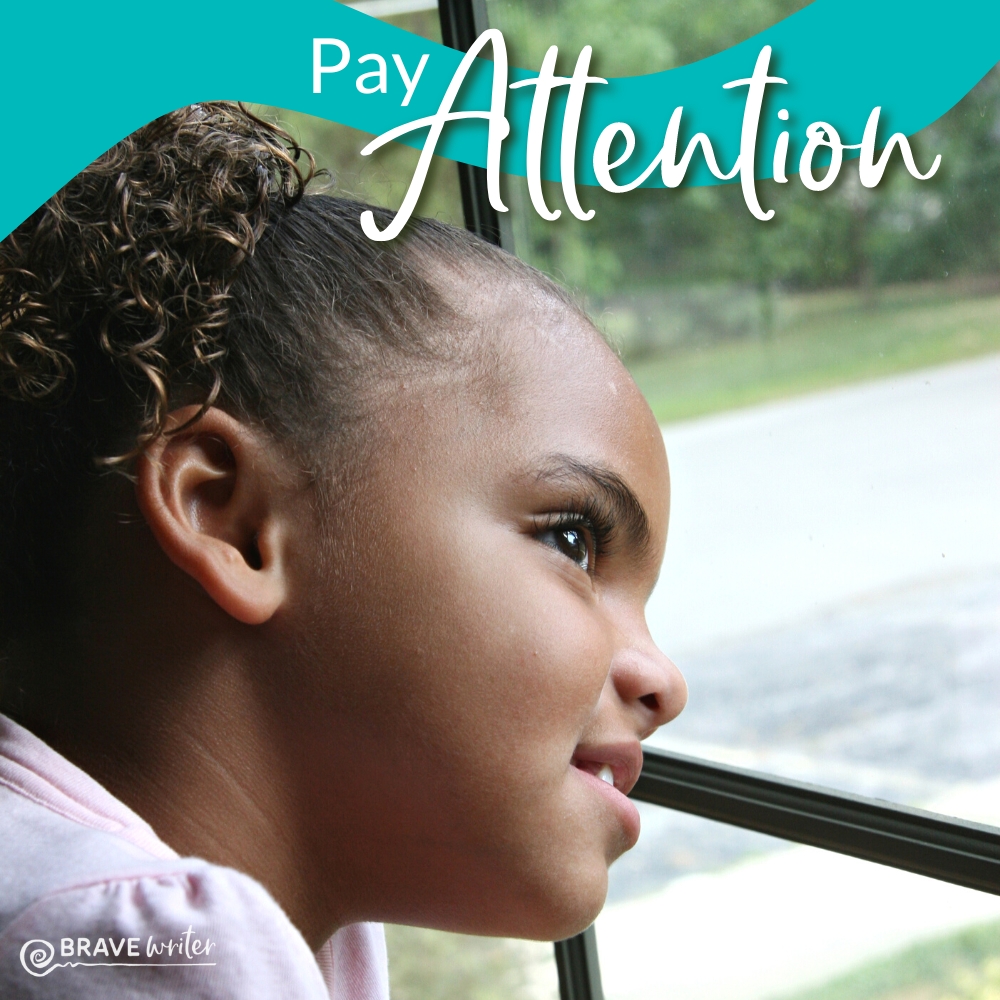
Make a funny face in the mirror (or snap a selfie!). Now describe your expression in detail so someone could imagine it without seeing you.
New to freewriting? Check out our online guide.

Make a funny face in the mirror (or snap a selfie!). Now describe your expression in detail so someone could imagine it without seeing you.
New to freewriting? Check out our online guide.
Tags: Writing prompts
Posted in Friday Freewrite | Comments Off on Friday Freewrite: Funny Face

As homeschooling parents, we understand the unique challenges that arise when the academic year ends. Summer is here, and so begins a time without the structure and routine of homeschooling. Our children, the very ones we’ve been teaching, are still with us, ready to start each day, and they need things to do.
This lack of schedule or routine doesn’t alleviate pressure. If anything, it can feel even more intense. There is a different kind of responsibility that comes with summer. The pressure to keep our children busy, to fill their days with creative activities, explorations, imagination, and physical activities like swimming or playing in the backyard, can be immense.
Yet, after a whole year of running the schedule and planning, many of us are burned out. The last thing we want is to shoulder the responsibility of planning a summer full of activities. But that doesn’t mean we want our kids to miss out on the opportunities summer can bring.
So, how do we navigate this period? How do we ensure our children make the most of their summer, even when it’s not officially “homeschooling” time? That’s what we want to explore today on the podcast. Let’s delve into how we can help our kids (and ourselves!) enjoy the summer without letting it become a pressure cooker.
Exploring the Idea of Boredom
Boredom isn’t necessarily a negative experience, nor should it be seen as a necessary evil that needs to be endured for creativity to emerge. As parents, we often resort to assigning chores when our kids complain of being bored. However, this might be overlooking a more significant issue – that the boredom might stem more from decision fatigue or an overwhelming array of choices, rather than a lack of things to do.
At times, it might seem easier to let children consume media than push them into creative activities. But we’ve noticed that a vacuum of time often leads both children and adults to default to low-engagement activities, which might result in feelings of restlessness or dissatisfaction.
Cultivating Creative Spaces to Block Out Boredom
Inspired by our book, “The Brave Learner,” we discuss how setting up an art table or a creative space can be a wonderful solution to stimulate children’s creativity. An appealing, accessible table laden with diverse ongoing projects invites children to explore and create.
The environment plays a crucial role in overcoming boredom. A space that encourages participation in a range of activities creates an attractive, engaging atmosphere. We believe in the importance of giving children something to look forward to, and we’ve seen how maintaining a rhythm to the day can motivate and benefit kids.
One fun idea is to create a dress-up station, especially for kids under 12. Imagine a designated space with a mirror, dress-up clothes on hangers, shoes, and hair accessories – all of these can spark their imagination. We can’t stress enough the importance of having easily accessible materials and rotating items to prevent overwhelming children.
We encourage the embrace of a bit of mess and chaos – creating an environment that stimulates children’s imagination and helps alleviate boredom.
Shaking Up Routines
Changing up routines, particularly during summer, is an exciting way to keep children engaged. This could mean altering the times of certain activities, such as watching movies or playing video games.
Introducing family game days can also break the monotony. Some games we love include Quiddler, Prime Climb, Settlers of Catan, Ticket to Ride, Pandemic, Apples to Apples, Bananagrams, Yahtzee, Uno, Cranium, and Set. Having a designated “game day” during the week can be a highlight for the whole family.
Strategies for Bored Teens
Teenagers present their own challenges, and we have suggestions for that, too. Encourage teens to venture outside, allow them to hang out at places like Panera, Barnes & Noble, movie theaters, and Starbucks. Give them the freedom to explore, whether that be through biking, walking, or just being outdoors. A sense of risk and adventure can be stimulating.
We fondly remember simple activities like late-night chats with friends on swings. Investing in a trampoline is another way to keep them engaged over a long period.
Other Potential Boredom-Busting Strategies
Adjusting regular rhythms can infuse energy and excitement into the mundane. Consider shaking up sleep schedules to accommodate more nighttime activities or assign chores that children find entertaining. For example, they might enjoy scrubbing the baseboards with a bowl of soapy water.
You don’t have to force yourself to do activities you dislike. Instead, play to your strengths. If you enjoy singing, organize a family karaoke session.
Even small changes in the environment can stimulate your children’s interests. Perhaps add new items to a coffee table to spark their imagination or leave part of the yard un-mowed to attract insects like dragonflies and fireflies.
Finally, having a range of activities can ensure children don’t feel deprived after screen time. Consider introducing geocaching – a fun, outdoor treasure hunt using an app, or frisbee golf, an engaging game that blends the joy of frisbee and golf.
At the end of the day, the goal is to make the most of our time with our children, create lasting memories, and ignite their natural curiosity and creativity.
Posted in Podcasts | Comments Off on Podcast: Summer Boredom Busters!

What if we were neighbors?
Are these not the kindest, most affirming messages?
They got me thinking:
What if I could pop into your living rooms, make friends with you, and sprinkle a little pixie dust on your homeschools? What if you could start your year with a cohort of other parents embarking on this audacious homeschooling journey, guided by me?
What if I could give you a “jumpstart”?
Let’s jump in together!
Here’s what you don’t need:
Here’s what I know creates confidence:
For six weeks, we’re going to walk into this school year together—linking arms.
Imagine kicking off the school year with
Now imagine experimenting with four different structures for homeschooling to find the best fit!
The members of the cohort will be hand selected by me.
Who is this program for?
In short, if you are a homeschooler with flexibility to experiment, try new models of learning, and feel the need for personal support, instruction, and accountability—this is for YOU!
To apply, please fill out this form.
Note: taking applications until Monday, July 24.
When you apply, you’ll be asked if you have a friend you’d like to join you in our cohort. Doing this process with a local or online friend will feel really supportive to you! You will each get a discount for tuition when you both apply. You’ll pay one price and settle up between you
Can’t wait to meet you!
Posted in Webinars | Comments Off on Jumpstart with Julie

When you show interest in how your child sees the world, that child will more naturally tell you the truth.
Your child tells you, “I don’t need math.”
You ask, “Why do you think that?”
Your child says, “I’m going to be a professional ball player.”
The temptation at this point is to say something like, “Professional athletes need math to calculate all kinds of statistics, their income, how to manage their wealth, and more.”
A ten year old child is not going to be motivated by adult concerns.
But what if you lean in more and say, “That’s interesting to me. Setting aside professional baseball for a moment, tell me more about why math doesn’t appeal to you. What is it about math itself you find problematic?”
Your child may feel freer to say: “Math is hard.”
Now you’ve pivoted to the child’s inner life. You aren’t being deflected by the reason your child gave—you are addressing what’s happening inside. You resist telling the child reasons that aren’t related to why the child is not willing to learn math.
When we pay attention to what’s happening inside the child, we make room for truth-telling rather than reason-giving or excuse-making.
The proper response when a child says, “Math is hard” is not “You’ll need it when you’re an adult,” but “It is hard. I can see why you want to avoid it. I wonder what we can do to make it less intimidating.”
Posted in Homeschool Advice | Comments Off on Pay Attention

How old are you? Now write that many interesting things about yourself.
New to freewriting? Check out our online guide.
Tags: Writing prompts
Posted in Friday Freewrite | Comments Off on Friday Freewrite: Interesting Things

I’m a homeschooling alum -17 years, five kids. Now I run Brave Writer, the online writing and language arts program for families. More >>
IMPORTANT: Please read our Privacy Policy.


